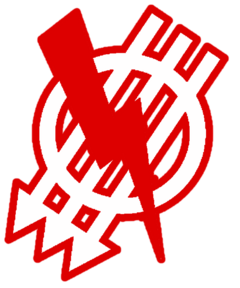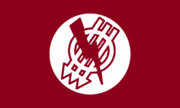Weranic Syndicalist Union
Weranic Syndicalist Union Ostischer Syndikalistische Union | |
|---|---|
 | |
| Abbreviation | OSU |
| Führer-Chairman | Siegfried Höcker |
| Founded | 15 April 1935 |
| Dissolved | 20 June 1942 |
| Split from | Weranic Section of the Workers' International |
| Headquarters | Westbrucken |
| Youth wing | Syndicalist Youth |
| Armed wing | Revolutionäre Kampfgruppen |
| Membership | 800,000 (peak) |
| Ideology | National syndicalism Revolutionary nationalism Left-wing nationalism Anti-capitalism Anti-communism Vanguardism |
| Political position | Left wing |
| Colours | Red |
| Anthem | Der morgige tag ist mein Tomorrow Belongs to Me |
| Party flag | |
 | |
The Weranic Syndicalist Union (Weranian: Ostischer Syndikalistische Union) was a national syndicalist political party in Werania. Founded and led by Siegfried Höcker, the OSU was inspired by the works of the national syndicalist writer Theophilus Kellner. The OSU was founded in 1935 when it split off the Weranic Section of the Workers' International by its revolutionary-vanguardist faction who opposed the notion of a reformist direction towards socialism that the OSAI had approved at its 1918 congress in the wake of the Great War. Although it was initially an orthodox-syndicalist outfit Höcker soon directed the OSU to adopt an increasingly nationalist direction, proclaiming to have formulated a "third way" between reformist socialism and capitalist democracy, claiming to be the heir of the Septemberist tradition in Weranic politics.
Following its formation the OSU quickly grew in statue due to its revolutionary rhetoric and calls to overthrow the state. The formation of the Revolutionäre Kampfgruppen (Revolutionary Combat Troops) by the OSU saw the organisation take on a paramilitary aspect, often clashing with the OSAI-affiliated Volksschutzfront and conservative Soldaten des Reichsbanners. The OSU would also position its appeal increasingly to the nationalist working class advocating the creation of a centralised dictatorship that would dismantle democracy, institute national syndicalism and purge the country both from "reactionaries" and the Nemtsovite left. It was anti-Witterite and anti-!Masonic, whilst being staunchly in favour of pan-Weranicism and lebensraum.
The OSU would become the third largest party at the 1939 Weranian federal election, but would fail to enter government. Despite its large membership its incredibly violent tactics alienated potential supporters alongside its hardline rhetoric.
In 1942 during a period of economic decline the OSU attempted to perform a coup d'état based on their vanguardist ideology with Höcker mistakenly believing a large amount of the army would support his seizure of power. The army alongside paramilitaries were able to easily defeat the attempted coup, with Höcker being arrested and the OSU being banned. The failed coup would lead directly to the formation of the Fatherland Bloc governments and the move in a more authoritarian direction in Werania.
History
Formation
Heyday
Attempted putsch and dissolution
Ideology
Organisation
Revolutionäre Kampfgruppen
Electoral results
| Election | Volkstag | Rank | Government | Leader | ||||
|---|---|---|---|---|---|---|---|---|
| Votes | % | ±pp | Seats won | +/− | ||||
| 1935 | 1,058,302 | 6.43% | New | 38 / 584
|
New | #7 |
Opposition | Siegfried Höcker |
| 1939 | 1,858,573 | 11.63% | +5.20% | 70 / 584
|
#3 |
Opposition | Siegfried Höcker | |